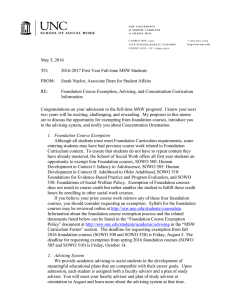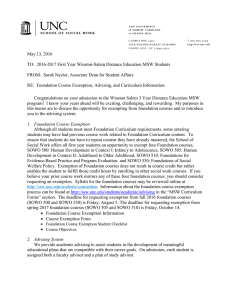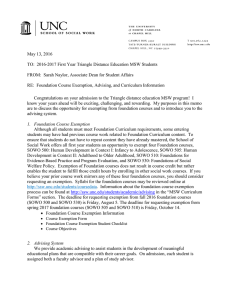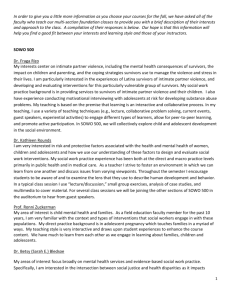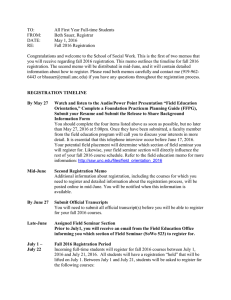Welcome to the UNC Chapel Hill School of Social Work Curriculum Options
advertisement
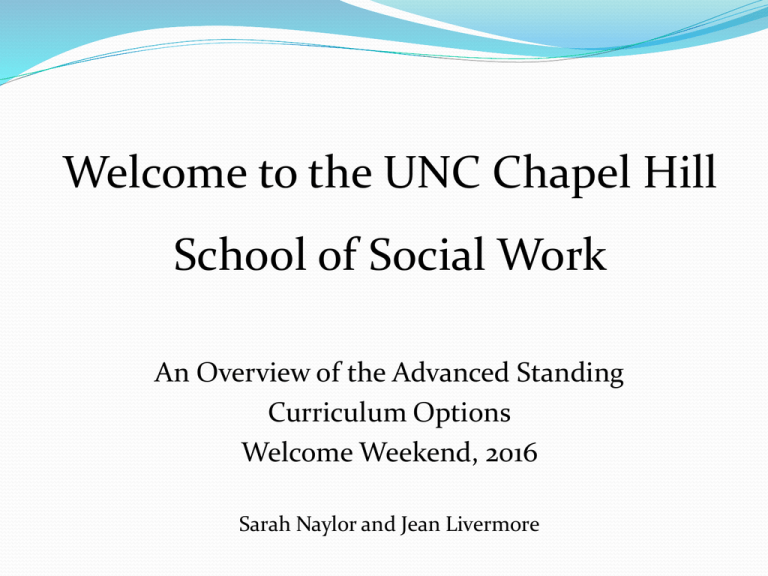
Welcome to the UNC Chapel Hill School of Social Work An Overview of the Advanced Standing Curriculum Options Welcome Weekend, 2016 Sarah Naylor and Jean Livermore Our Mission The mission of the School of Social Work is to advance knowledge regarding social problems & programs, to educate social workers for advanced practice, & to provide leadership in the development of socially & economically just policies & programs that strengthen individuals, families, groups, organizations, and communities. What is the Curriculum? Summer Bridge Program Flexible Advanced Year Concurrent Field Advising Overview of the Curriculum: Summer Bridge Program (13 credit hr.s) Summer Session I: Orientation: Tues., May 10, 2016 Classes: May 11-June 16, 2016 SoWo 715: Advanced Standing Bridge Course (6 credit hours) Policy Practice (DP/CMPP) HBSE Classes are held Monday - Friday, 9am – 12:30pm Summer Session II: SoWo 510: Foundations for Evidence-Based Practice and Program Evaluation (3 credit hours) Mondays: June 20, June 27, July 5 (Tues.), July 11, and July 18; final assign. due by July 25) 9 – 12pm (2-4:50pm on the 20th) SoWo 522: Advanced Standing Practicum (4 credit hours) Field: June 21 – July 28, 2016; Tuesday – Friday 32 hours per week Advanced Curriculum: Continued Two Concentration Areas Community, Management & Policy Practice Direct Practice Working with your faculty advisor, you will develop individualized plan of study that meets your learning/professional goals & the curriculum requirements Courses in the Advanced Curriculum Year (27 credit hours) Concentration Courses, Fall: HBSE/Practice course in area of concentration (3) Electives* (6) SOWO 820 Social Work Field Practicum III (6) Concentration Courses, Spring: Advanced Policy (1.5) Advanced Research (3) Electives (1.5) SOWO 821 Social Work Field Practicum IV (6) *Many electives will be half semester courses. Advanced standing students are required to take 7.5 elective credit hours, but may choose to take more. HBSE/Practice Courses-Fall Semester, Final Year HBSE/Practice: Direct Practice SOWO 840 Adult Mental Health: Theory and Practice SOWO 841 Child Mental Health: Theory and Practice SOWO 842 Families: Theory and Practice SOWO 843 Older Adults: Theory and Practice SOWO 844 Adolescent Mental Health: Theory and Practice SOWO 845 Health: Theory and Practice HBSE/Practice: Community, Management and Policy Practice SOWO 874 Administration and Management: Theory and Practice SOWO 875 Community: Theory and Practice SOWO 881 Development Theory and Practice in Global Settings Advanced Policy Courses-Spring Semester, Final Year Common framework of policy analysis & change strategies, specialized topics SOWO 739 Child Welfare Policy SOWO 831 Substance Abuse Policy SOWO 834 Advanced Policy Practice SOWO 835 Poverty Policy SOWO 836 Health Access & Health Disparities Policy SOWO 837 Disability Policy SOWO 838 Policies Impacting Military Families Three-Credit, 14-Week Elective Courses: Direct SOWO 700 Alcohol, Tobacco, and Other Drugs (ATOD): Abuse and Dependence SOWO 701 ATOD Biomedical Basis SOWO 760 ATOD Clinical Practice SOWO 761 ATOD Diverse Populations SOWO 767 Differential Diagnosis and Case Form: Mental Health SOWO 850 School Social Work Policy/Practice SOWO 852 Social Work Practice with Couples SOWO 853 Approaches to Brief Treatment SOWO 855 Trauma and Violence SOWO 856 Care of the Dying and Bereaved Throughout the Lifespan SOWO 860 Child Welfare Perspectives and Practices Three-Credit, 14-Week Elective Courses: Community, Management Policy Practice SOWO 799: Community-Led Sustainable Development SOWO 799: Leadership and Management in Public Human Service Agencies SOWO 880: Sustainable Development SOWO 882: Citizen Participation & Volunteer Involvement SOWO 883: Fundraising & Marketing SOWO 884: Executive Leadership SOWO 885: Financial Management 1.5-Credit, 7-Week Elective Courses: Direct SOWO 705 Mental Health Recovery and Psychiatric Rehab SOWO 750 Cognitive Behavioral Therapy SOWO 751 Behavioral Interventions with Children SOWO 753 Interpersonal Psychotherapy SOWO 755 Issues for Contemporary Clinical Practice SOWO 758 Differential Diagnosis of Mental Health Disorders SOWO 764 Motivational Interviewing SOWO 765 Social Work Practice with Groups SOWO 766 Dialectical Behavioral Therapy: Theory and Practice SOWO 769 Integrated Behavioral Health SOWO 769 Psychosocial Treatment of Psychotic Disorders SOWO 769 The Satir Growth Model SOWO 769 SW at the Interface of Mental Health & Criminal Justice 1.5-Credit, 7-Week Elective Courses: Community, Management Policy Practice (CMPP) SOWO 739 Immigration and Citizenship Law and Policy SOWO 792 Program Development and Proposal Preparation SOWO 793 Asset Development, Practice and Policy SOWO 799 American Indian Community Development Additional Electives SOWO 709: Human Migration: implications, Policy, Practice, and Research (3) SOWO 709 Working with Refugee/Immigrant Survivors of Torture & Trauma (1.5) Professional Development Leadership Workshops Professional Development Workshops MSW Resume Building Before, During and After the Interview Review of Licensure Process Macro Networking Night Clinical Lecture Series Motivational Interviewing and Readiness to Change Loving Kindness Mediation Practice Ethics of Self-determination in Aging Adults Academic Planning Support Resources for developing your curriculum: Faculty advisor Plan of study advisor Academic and Student Affairs faculty & staff Planning meetings Prompts/directions/dates communicated regularly Welcome Materials You should have received welcome materials in mid-March Registration (will begin in June) Advising Field placement planning Orientation Additional information (residency for tuition purposes, parking, Accessibility Resources and Service, UNC email setup, etc.) Don’t Forget the SSW Website http://ssw.unc.edu/ Look at current schedules/course offerings Review previous syllabi Find student forms View student calendar Learn how to get involved Field Education Advanced Standing Field Placements MSW Welcome Weekend 2015 Jean Livermore, MSW, LCSW Field Education Integral component of the MSW curriculum (CSWE) Opportunity to integrate knowledge, skills, & values learned in classroom (theory practice) test & validate professional ethics & values in practice setting enhance self-awareness & professional use of self Types of Placements General health care & psychiatric hospitals County DSS’s and Public Health Departments Private non-profit/not-for-profit agencies Domestic violence services Substance abuse facilities Schools Homeless shelters Hours in Field • Complete ~ 864 hours • ~ 184 • hours Summer Semester June 24-August 1 (Tuesdays-Fridays) • ~ 304 • Begins August 19 • ~ 312 • hours Fall Semester hours Spring Semester Ends April 27 • Typically Wednesdays, Thursdays, and Fridays • Some flexibility if it works for both student & agency • Exceptions must be approved by Director of Field Teamwork Field Education Program SSW Faculty Agency Field Instructor Task Supervisor Student Field Faculty Field Instructors MSW with > 2 years experience Identify & design learning assignments Offer appropriate learning activities Provide weekly supervision Collaborate on learning plan & evaluations Field Faculty The liaison between School, agency, student, field instructor Support students & Field Instructors Problem-solve/trouble-shoot/conduct 3-way conferences Review performance & submit grades Placement Process • Consider your Learning Goals & Objectives • Social work knowledge & skills you hope to gain in your field placement • What client population/social problems are most interesting to you? • What practice areas will you consider? • Complete Advanced Standing Planning Guide on Field Ed website & upload current resume Conference with Field Office • Meet or speak with Field Faculty soon—we will contact you once we receive your planning guide • When you begin orientation in May, and in person meeting to narrow choices • You will be matched with your interests, to extent possible • You’ll receive a ‘match’ email with information on how to contact your potential Field Instructor to schedule interview Interview with Agencies Schedule an interview & prepare Bring your resume & planning guide Prepare as for a job interview Describe prior relevant experience What do you hope to learn? What activities are available for students? What questions do you have about the Agency & the program? Agency Requirements Some agencies (hospitals, public school systems and others) require: criminal records checks and/or and/or drug screening and/or TB tests … just as they require for employees or volunteers Field Education Website http://ssw.unc.edu/programs/masters/fieldeducation Can view field education manual, information for current students, etc.
